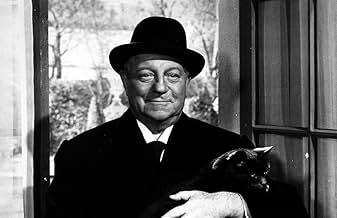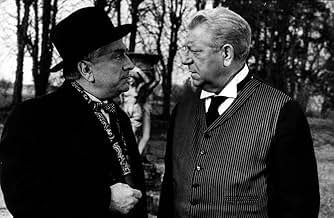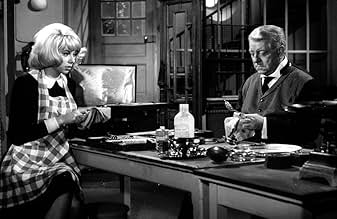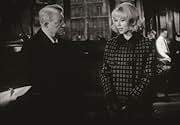Jean Gabin had been one of France's biggest stars during the 1930s with several films for great directors such as Marcel Carne', Julien Duvivier and Jean Renoir; his later output wasn't anywhere near this level and apart from the odd title - Max Ophuls' LE PLAISIR (1952), Jacques Becker's TOUCHEZ PAS AU GRISBI (1954) or Renoir's own FRENCH CANCAN (1954), to mention the ones I've watched myself - the majority of these could be deemed fillers.
Still, a good many of them have turned up from time to time on TV: I've missed a few and watched others - but, then, I'm most interested in the ones which fall into the thriller genre. This promised to be one such title and, sure enough, the first half is interesting as it deals with banker Gabin about to commit suicide after the death of his faithless wife but being dissuaded by a chance meeting with former maid Mireille Darc, who has herself fallen on hard times and become a hooker! As he had left a suicide note, his relatives eye his wealth greedily and even insinuate themselves in his vacant household (since Gabin finds it convenient to appear dead to the world!); however, he hitches up with Darc's criminal associates and decides to break into his own house (unbeknownst to the rest of the gang - in fact, he's only referred to as "Monsieur", hence the film's title) and rob the safe!!
The second half, however, in which Gabin and Darc ostensibly present themselves to a rich household in the countryside as servants (in preparation for another heist) turns the film into a pleasant - and typically French - comedy of sexual manners, with Gabin covering up the female owner's escapades from husband Philippe Noiret (one of my favorite bits during this section is when Gabin is asked to pick her up from one such tryst after her car has broken down, and an old vicar turns up and helpfully - but cluelessly - suggests to them what might be wrong with the vehicle), while their son falls for Darc (whom Gabin is passing off as his own daughter!). While all this is undeniably entertaining, it jars with the earlier section as Gabin's accomplices are unaccountably removed from the picture - so that his decision to remain in Noiret's employ (other than the fact that he is being paid for his services and, being thought dead by his relatives and colleagues, won't be missed) is never explained!
Even if older and plumper, Gabin's quietly authoritative screen presence is unmistakable - and the film also benefits from having the gorgeous Darc (best known for playing the female lead in Jean-Luc Godard's masterpiece WEEK-END [1967]) on board, as well as a cheerful score by Georges Van Parys.


































